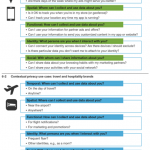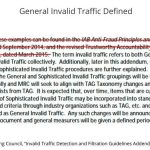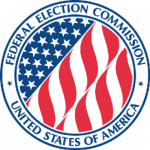Consumer Groups Fire Back At Broadband Industry, Urge FCC To Preserve Privacy Rules
Consumer Groups Fire Back At Broadband Industry, Urge FCC To Preserve Privacy Rules
by Wendy Davis @wendyndavis, March 7, 2017
Privacy advocates and consumer groups this week officially urged the Federal Communications Commission to retain tough new regulations that could limit broadband providers’ ability to use data about their subscribers.

“Before the internet was developed, consumers relied on the law to protect their privacy and the security of their correspondence through the mail, telegram, and telephone. Consumers should not have less privacy and security just because our systems of communication have evolved to include the internet,” Consumers Union and the Consumer Federation of America say in papers filed with the FCC late Monday.
The rules, passed 3-2 last October, require broadband providers to obtain consumers’ opt-in consent before drawing on their Web-surfing history or app usage data for ad targeting.
New FCC Chairman Ajit Pai, who dissented from last year’s vote, has indicated that he supports repealing the rules. Pai has already succeeded in staying a portion of the privacy rules that require providers to take reasonable security measures to protect consumers’ data.
Trade organizations for the ad industry and broadband providers are asking the FCC to reconsider the privacy order. The organizations contend that the new regulations — especially the call to obtain opt-in consent before using data for ad purposes — are inconsistent with looser standards put out by the FTC, which broadly recommends that Web companies allow people to opt out of the collection and sharing of non-sensitive data. The FTC also suggests that companies should obtain opt-in consent before sharing a narrow category of “sensitive” data — including health information, precise location data and the “content” of their communications, including social media posts and search queries.
But the Consumers Union and the Consumer Federation of America argue that broadband providers are not comparable to other Web companies.
“Broadband internet access service providers have a unique, sweeping view into consumers’ daily online lives, and should be held to a higher standard than edge providers,” the groups write. They add that broadband providers “have a different and far more intimate knowledge of a consumers’ online activities” than search engines, social networking services or other so-called “edge” providers.
Other advocacy groups, including the Center for Digital Democracy, Campaign for a Commercial Free Childhood, Electronic Privacy Information Center, Common Sense Kids Action and Consumer Action, point out in a separate filing that the new FCC rules already are aligned with recent FTC rules regarding children’s data.
Five years ago, the FTC issued children’s privacy rules that effectively banned the use of behavioral-targeting techniques on sites and apps directed to young children, absent parental consent. Those rules, which interpret the Children’s Online Privacy Protection Act, define personal information to include data used by ad networks to create profiles.
“The broadband privacy rules are consistent with the FTC approach and are necessary, although not sufficient, to protect children’s privacy,” the CDD and others argue.
“Today’s generation of children will be the first to have a digital footprint for their entire lives. The quantity and detail of this information makes children especially vulnerable to targeted marketing,” the groups say. “If ISPs were permitted to use children’s web browsing and app usage data without parental permission to market directly to children, or to sell this information to others for marketing, advertisers would have a much greater ability to take unfair advantage of children.”
MediaPost.com: Search Marketing Daily
(61)













